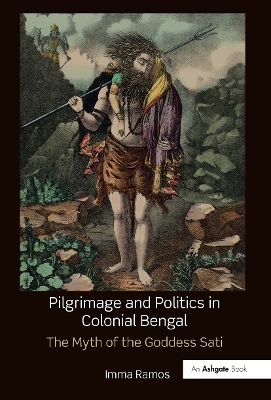
Pilgrimage and Politics in Colonial Bengal
Routledge (Verlag)
978-1-032-47693-3 (ISBN)
From the late nineteenth century onwards the concept of Mother India assumed political significance in colonial Bengal. Reacting against British rule, Bengali writers and artists gendered the nation in literature and visual culture in order to inspire patriotism amongst the indigenous population. This book will examine the process by which the Hindu goddess Sati rose to sudden prominence as a personification of the subcontinent and an icon of heroic self-sacrifice. According to a myth of cosmic dismemberment, Sati’s body parts were scattered across South Asia and enshrined as Shakti Pithas, or Seats of Power. These sacred sites were re-imagined as the fragmented body of the motherland in crisis that could provide the basis for an emergent territorial consciousness. The most potent sites were located in eastern India, Kalighat and Tarapith in Bengal, and Kamakhya in Assam. By examining Bengali and colonial responses to these temples and the ritual traditions associated with them, including Tantra and image worship, this book will provide the first comprehensive study of this ancient network of pilgrimage sites in an art historical and political context.
Imma Ramos is curator of the South Asia collections at the British Museum in London. Her research interests revolve around the relationship between religion, politics and gender in South Asian visual culture.
Contents
Introduction
A myth of dismemberment
Sati and her rise as a patriotic icon
The formation of Hindu identity: From cultural to revolutionary nationalism
Layout of the book
Chapter One
Kalighat souvenirs and the creation of Sati’s iconography
Sati’s place in the visual rhetoric of motherland
Sati’s portrayal in Kalighat pilgrimage souvenirs
The invocation and reinvention of Sati
The romanticisation of martyrdom
Subverting Christian iconography
Shiva, asceticism and Bengali masculinity
Sati, suttee and the story of Padmini
The enduring power of Sati
Chapter Two
Kamakhya’s erotic-apotropaic potency and the forging of sacred geography
Martial and maternal: Kamakhya’s sculptures
The promotion of fertility and protection: Kamakhya’s female archers
Subversive sexuality: The reception of Kamakhya during the colonial period
Colonial mapping versus sacred geography
Bengal’s love affair with Kamakhya: Pilgrimage as a nationalist device
Chapter Three
Tantra’s revolutionary potential: Tarapith and Bamakhepa’s visualisation of Tara
Understanding Tara
Understanding Tantric ritual through Tara
Bamakhepa, Tantra and revolutionary potential
Terrifying and benevolent: Visions of Tara
The sweetening of death
Chapter Four
Contesting the colonial gaze: Image worship debates in nineteenth-century Bengal
Murtipuja, darshan and rituals of consecration
Ram Mohan Roy and the Brahmo Samaj movement
‘Inconsistent with the moral order of the universe’: The Reverend Hastie’s views on murtipuja
The backlash: Bengali responses to Hastie
The Saligram idol case: Murti and artefact
The Attahas and Khirogram Pithas: The charisma of antique murtis
Conclusion
Epilogue
Reviving Sati’s corpse: Mother India tours and Hindutva in the twenty-first century
Bibliography
| Erscheinungsdatum | 11.01.2023 |
|---|---|
| Zusatzinfo | 10 Illustrations, color; 28 Illustrations, black and white |
| Verlagsort | London |
| Sprache | englisch |
| Maße | 174 x 246 mm |
| Gewicht | 258 g |
| Themenwelt | Kunst / Musik / Theater ► Kunstgeschichte / Kunststile |
| Geschichte ► Teilgebiete der Geschichte ► Religionsgeschichte | |
| Geisteswissenschaften ► Religion / Theologie | |
| Sozialwissenschaften ► Soziologie ► Spezielle Soziologien | |
| ISBN-10 | 1-032-47693-1 / 1032476931 |
| ISBN-13 | 978-1-032-47693-3 / 9781032476933 |
| Zustand | Neuware |
| Informationen gemäß Produktsicherheitsverordnung (GPSR) | |
| Haben Sie eine Frage zum Produkt? |
aus dem Bereich


